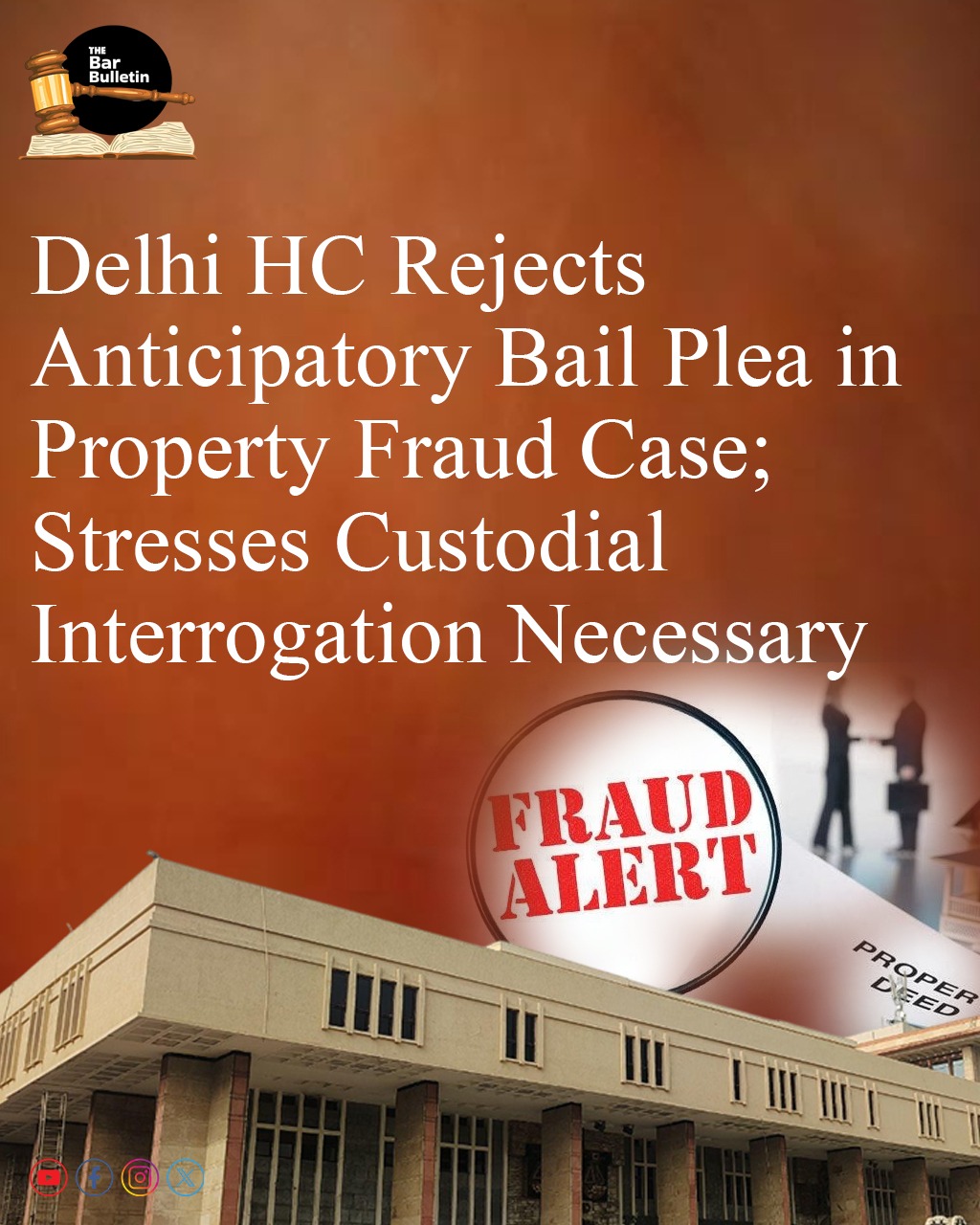The Delhi High Court dismissed an anticipatory bail application filed by the petitioner in connection with FIR No. 523/2024 under Section 420 IPC registered at PS Shakarpur, observing that custodial interrogation was both necessary and justified in view of the serious allegations and evasive conduct of the petitioner.
The case arose from allegations that in January 2019, the complainant entered into an agreement with the petitioner for purchase of property No. WB-57A, Ganesh Nagar-II, Shakar Pur, Delhi. It was alleged that sale deeds were executed in 2019 for different portions of the same property, with the petitioner repeatedly representing that the property was free from all encumbrances. However, it was contended that in 2023, the complainant received documents from the court in Contempt Case No. 1415, disclosing that a status quo order was already in force on the property at the time of sale, which had been fraudulently concealed by the petitioner.
The Petitioner contended that the allegations made against him were false, frivolous, motivated and claimed that it had been made in order to harass and humiliate him. It was submitted that the dispute was clearly civil in nature but it was given a criminal colour. It was argued that the complainant and another person helped the petitioner and gave him financial aid and signed various documents. He claimed that he was also kidnapped, and though all the payments have been returned by him but the original receipt was with the complainant and petitioner retains only a photocopy. It was further submitted that the petitioner was well aware of the property to be under encumbrances and still went ahead with the sale, and had provided his mobile phone containing the video clip of a bank conversation disclosing the order restraining transfer, along with a pen drive and transcript to the IO, which clearly reveals that complainant was aware of the facts and no misrepresentation was made. The petitioner had already joined the investigation and was ready and willing to cooperate and abide by any condition imposed by the Court.
However, the Ld. APP submitted that the petitioner had sold the properties, despite there being a subsisting stay order passed by the Court. It had been pointed out that the sale deed falsely recites that the property was free from all encumbrances, legal proceedings, litigation, or injunctions. It was further submitted that nothing of significance had been disclosed by the petitioner during the course of investigation, custodial interrogation was required since the applicant had claimed that he did not execute the sale deed, and the contention that the complainant was aware of the pending litigation was untenable, the conduct clearly reflecting an intention to cheat.
The Court observed that during investigation, certified copies of both the sale deeds dated 05.02.2019 and 09.08.2019 had been obtained from the co-purchaser, who had also submitted documents showing detailed payments made to the petitioner. The status report revealed that the petitioner had appeared for interrogation under protection granted by the Sessions Court but had given contradictory and evasive replies, claiming that he did not know the documents he signed were sale deeds and that the transaction was only a friendly loan. As per the status report, on analysis of the video and transcript submitted by the petitioner, it was found that no mention of any pending litigation or stay order was made in the conversation, rather an admission was made by the petitioner of arranging Rs. 20 lakhs as a bribe for a government officer. The argument that the petitioner was unaware of what he was signing was held to be prima facie implausible since execution of sale deeds required personal appearance, thumb impression, photographs and verification before the Sub-Registrar. The original receipt of repayment of money to the complainant was also not produced by the petitioner.
Justice Ravindra Dudeja, while applying the principle that anticipatory bail was an extraordinary remedy intended to be granted only in exceptional cases, referred to the Supreme Court’s decision in Srikant Upadhyay and Ors. v. State of Bihar and Anr, 2024 (SC) 232, wherein it was reiterated that anticipatory bail is not the norm and its grant must depend on the facts and circumstances of each case, to be applied with caution, particularly in serious offences where premature protection could hamper investigation or enable evidence tampering. It was held that the petitioner’s conduct in selling the property despite a stay order, making false declarations in the sale deeds and subsequently failing to join investigation, militates against the grant of anticipatory bail. The Court that as per the status report, the petitioner was repeatedly served with notices under section 35(3) BNSS, but failed to appear.
Having regards to the seriousness of the allegations, the petitioner’s evasive conduct, the stage of the investigation, and the settled principles governing anticipatory bail, the Court found no ground for exercise of discretion in favour of the petitioner. The apprehension of misuse of the concession of anticipatory bail was held not to be unfounded in the present factual matrix, and accordingly, the application for anticipatory bail was dismissed.
Appearances:
Petitioner: Mr. Tushar Sannu, Mr. Priyankar and Ms. Ishika Jain, Advocates
State: Mr. Aman Usman, APP
Complainant: Mr. Sarwar Raza, Mr. Muhammad Zaid, Mr. Mohd. Waseem, Mr. Nabil Raza, Mr. Arnab. C, Mr. S. Ahmed and Ms. Shreya Kumar, Advocates



